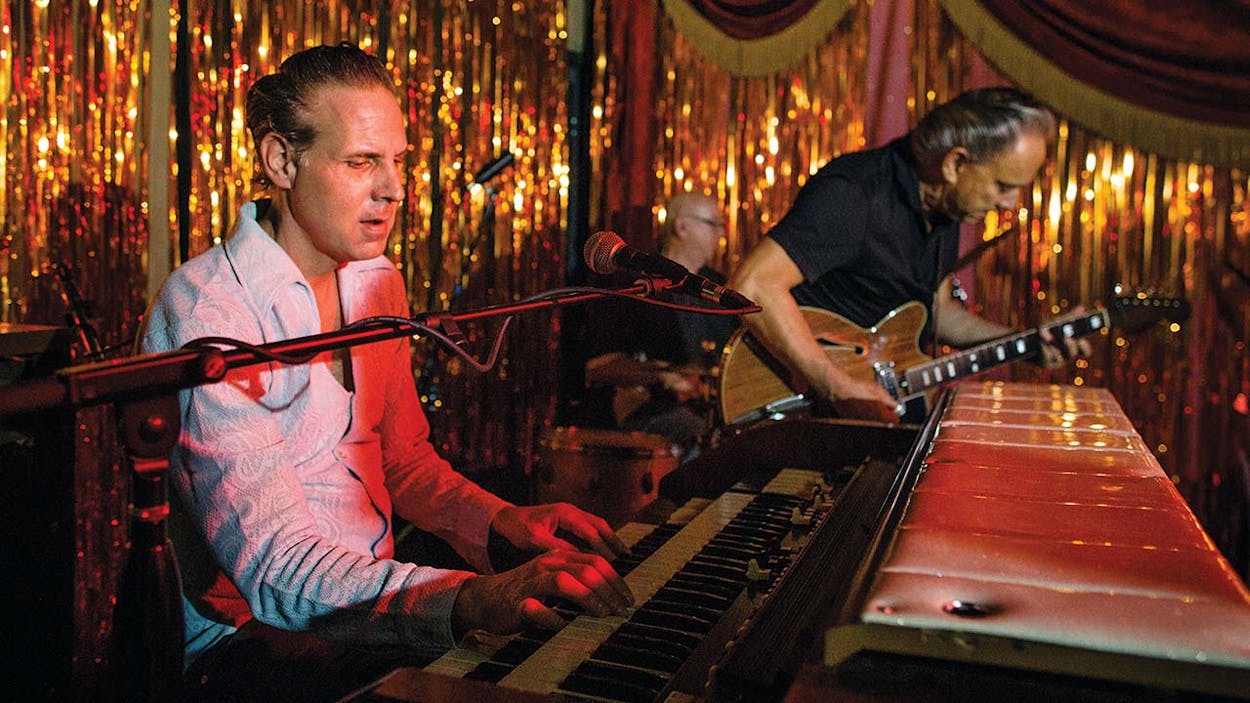On the last afternoon of 2014, Austin organ player Mike Flanigin drove with Billy Gibbons from Houston to Austin. The pair had just spent a few days in Gibbons’s studio, working on what will be the ZZ Top front man’s first-ever solo album, and both men had New Year’s Eve gigs in Austin: Flanigin was playing with legendary local bluesman Jimmie Vaughan at the Continental Club spin-off C-Boy’s Heart & Soul, and Gibbons was appearing as a special guest of Willie Nelson’s at ACL Live. On the way to town, they stopped at a gas station in La Grange, the setting of one of ZZ Top’s most famous songs.
“It was surreal to stand back and watch people’s reactions,” says Flanigin. “They freaked out.”
Truth be told, even though Flanigin and Gibbons are longtime friends, a part of him was freaking out a little too. The first concert he ever went to was a 1981 Rolling Stones show at the Cotton Bowl, where ZZ Top and Vaughan’s band the Fabulous Thunderbirds opened. Decades later he would befriend both Gibbons and Vaughan in Austin, where he’d forged a career as the city’s go-to Hammond B-3 organ player, thanks largely to his trio’s eight-year residency at the Continental Club’s upstairs Gallery and at C-Boy’s. The Gallery holds just fifty people, C-Boy’s maybe twice that, yet week in and week out, Flanigin shows up, usually with either Vaughan or former Bob Dylan guitarist Denny Freeman filling the trio’s guitar slot. Gibbons has sat in with the group a dozen or so times, and sometimes Vaughan and Gibbons have shared the small stage together, often to cover tunes from the underrated Dallas blues pioneers the Nightcaps.
“There aren’t a lot of bandstands you can hop onto where everyone knows ‘Wine, Wine, Wine’ or ‘Thunderbird,’ ” Flanigin says. “And when they come up, these huge stars are just musicians, playing because they love the music. But if you’re in the audience, or you’re me, you’re thinking, ‘Whoa. There’s Billy Gibbons and Jimmie Vaughan! When does that happen?’ ”
Gibbons and Vaughan both appear on Flanigin’s long-awaited debut solo record, The Drifter, which also includes contributions from Gary Clark Jr., Kat Edmonson, and Alejandro Escovedo. And while on paper it might look like one of those records where a sideman calls in favors from high-profile names, everybody on Flanigin’s record has been a confidante for years. Edmonson and Flanigin go back to the days when they were navigating Austin’s close-knit jazz and blues scenes, while Flanigin and Escovedo have spent years hanging out in the dressing room of the Continental, where Escovedo also has a residency. And Clark? Five years ago, after Edmonson gave up her weekly gig at an Austin wine bar, she handed it off to Flanigin and Clark, who played as a duo. “Nobody came, Gary eventually left, and then I got fired,” Flanigin says.
That was around the same time Flanigin was going through a divorce and drinking heavily. It was also the same time he rediscovered Jim Croce’s confessional 1972 album You Don’t Mess Around With Jim, which inspired him to try his hand at writing similarly personal songs. And over the next four years he’d duck into various Austin studios and record them, song by song, with friends he thought could sing them better than he could.
“If Kat or Gary had not been well-known artists, I still would have had them on the album,” says Flanigin. “But thank goodness for me, people know who these folks are. I don’t want to pretend I’m unaware of that. But it wasn’t my reason for doing it.”
In fact, from a business standpoint, Flanigin says the big names wound up working against the record; labels told him they weren’t interested because it would be impossible to gather those musicians again for the kind of tour it takes to promote a major-label album. So after a successful Kickstarter campaign, Flanigin—at fifty years old—has added “label owner” to his résumé. It’s been significantly more work than he expected, yet he won’t rule out doing it all again.
“I could make six albums of collaborations with people I’d love to play with, because they’re everywhere,” says Flanigin. “That’s the thing about Austin: there are so many inspiring musicians you don’t get to share a stage with because they’re playing their gigs, you’re playing yours. But what doesn’t happen onstage can happen in the studio. So maybe The Drifter Returns. Or The Drifter Returns Again. Or More Riding With the Drifter. I’d be a fool not to consider it. And I know for a fact it would be fun.”







